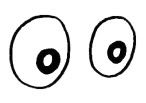Day 6: Saturday 6 June
Annotations
The YouTube annotation system is soooo great for this exercise! It's really easy to use and to put them at the right time. And the process of putting the annotations in is what really makes me remember - and learn from - the mistakes.
If I just made the video, uploaded it and then read the comments ... I would just read them and think, oh OK that was a mistake and probably quickly forget about it. But when I put the annotations in, I'm forced to listen to myself again and and compare it with the correction that I'm writing in ... and it really makes it stick! Yay for the YouTube annotation system!
When it first came out I thought, "Oh, that's nice, but I don't really have a use for it" - and I don't really with The Daily English Show - but for this exercise it's fantastic.
2 minutes
I think the two minute time length is perfect. It's long enough me to say something (a story, an opinion etc) - and produce enough language for there to be something to work on. If the time was too short, I might not say enough for there to be many mistakes to work with. If the time was too long, it would perhaps be too overwhelming. Also the time length helps with the motivation to continue - and to start in the first place. I really don't have time because I'm so busy with tdes - but I just think, "Oh, it's only 2 minutes", and it doesn't seem like a burden. The corrections are also manageable too.
1 month
I think the one month time frame is also the right length. I think it's good to have a fixed-length of time.
Side effect - vocab from comments
An important part of the project is reading the comments to learn from the mistakes people point out. So I look up the words that I don't understand and learn some new words in the process. Great! I've decided to keep a note of them in this blog.
ます形
I mentioned in video #2 that I wasn't sure about when to use the masu form. There are several reasons for this. You don't just use all masu form or all not masu form - it's mixed up. It's the same in English - if you're in a business meeting you don't use 100 percent formal words and if you're will friends you don't use 100 percent slang - you mix it up as a kind of package to transmit your message with the right mood that fits the situation or the point/feeling you're trying to convey.
In Japanese, I seem to do OK in super formal or super casual situations - but when it's kind of in between, I get a bit lost.
As for this situation, talking to a camera ... is it formal or not? I don't know the people watching, so perhaps I should be formal. Then again, I don't want to come across as some gushy, phony, nauseating TV presenter - because I can't stand that style. And, anyway, I'm not a TV presenter or an expert in anything ... I'm just a random girl sitting in small apartment on a cheap (but very stylish!) old-scribbled-on-by-children couch rambling on about nothing in broken Japanese.
And another thing: I'm talking to the camera, which is an old, half-broken (the screen and rewind functions only work when they feel like it) pile of poo ... not deserving of my masu kei, surely! Kidding, of course, I know I'm really talking to the people watching.
Finally, though, I do understand how it looks really bad coming across as too casual in the wrong situation. Like when I meet a Japanese person for the first time and they use a lot of slang or say "fuck" in the wrong place/situation ... I think hmmm ... it would probably be better to just stick to simple, clear English until you get to a pretty high level, and then you can start throwing a few fucks in here and there - in the right places - to give spice your language up a bit.
So I guess that's the essence of the feedback people have given me about using ます形。And I've decided to take their advice and go with that for now. I'll be aiming for an overall polite level ... but again, that doesn't mean you should finish everything with です・ます... it's a mixture, as I said, so I'm sure I'll still make a lot of mistakes with getting the mixture right.
And, at the end of the day, I don't want to over think it. I think this falls into the nuance category - something with will naturally improve overtime but not something to focus on so much that it stalls you and keeps you from taking risks, speaking more and more, making mistakes etc
vocab
腹痛 ふくつう stomachache
目安 めやす aim
怠い だるい dull, sluggish, weary
川沿い かわぞい
川沿いに along a river
川沿いの道 a riverside path
質の高い しつのたかい good quality
設定 せってい establishment
設定する establish, set up, create ...
指摘 してき point out
Saturday, June 6, 2009
Subscribe to:
Post Comments (Atom)

No comments:
Post a Comment